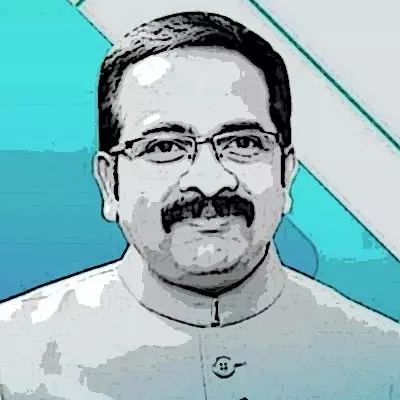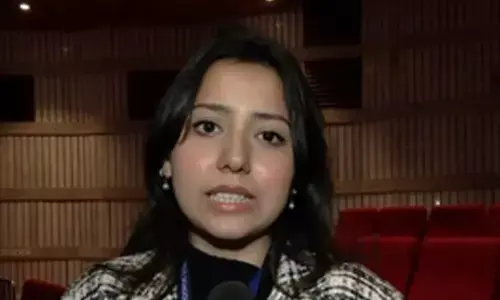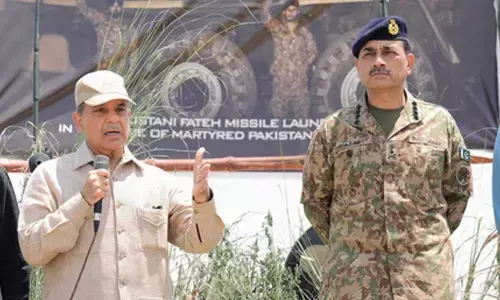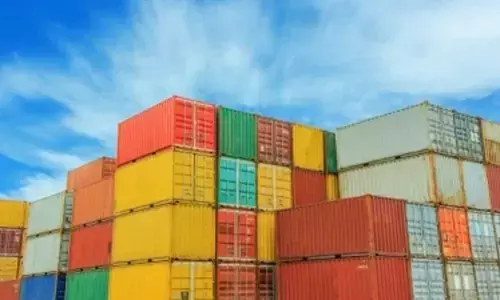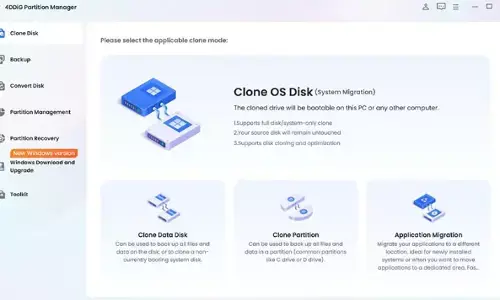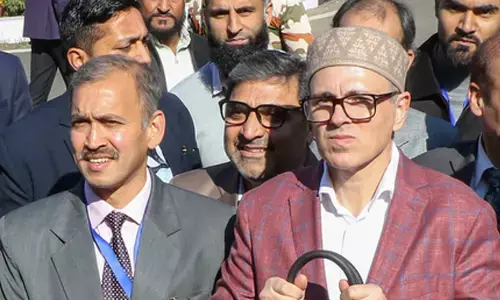One nation AND one election
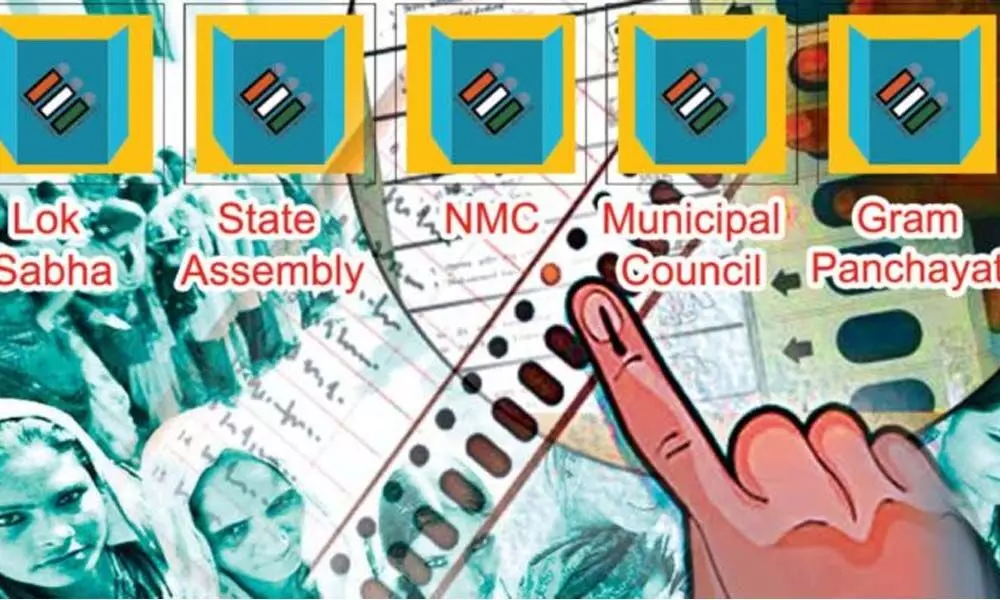
One nation AND one election
This is a quintessential time to initiate and support a path-breaking political and electoral reform for India
This is a quintessential time to initiate and support a path-breaking political and electoral reform for India. 'One Nation and One Election' can be a game changer reform for the nation. This reform can positively impact poverty alleviation, public welfare, governance-delivery and inclusive development.
India is a unique nation. It's democracy, demographics, politics; economy and civic-issues are quite different from any other nation on this planet. To continue on the same beaten path adopted from its colonial past, doesn't serve India and its people well. There is no great scientific approach or structured logic behind the current election system, which India adopts today. It's just an acquired acceptance of a system over decades of repeated implementation. No one questioned it, so it continues unchallenged.
Visionary leadership of any nation requires, a review of existing systems with a fresh perspective and follow through with reform, if required. Reforms should drive incremental efficiency to impact productivity and pre-set social outcomes.
In fact, the current electoral system promotes massive corruption and inefficiency in the nation. I strongly believe the electoral system of India is one of the root causes for many social challenges, like corruption in governance, unreliability, low-productivity, entitlement, habituated dependence on welfare schemes, low levels of education and painful poverty.
It's surprising and questionable that successive governments and the Election Commission of India has not initiated any substantive electoral reforms in the last 70 years, except switching from physical ballot to Electronic voting machines.
Did the voter demographics, economic stature, nature of politics, electoral-eco-system not change in the last 70 years? Can the same system serve fifth, sixth or next generations of Indians? Shouldn't there be a more efficient and futuristic system which need to evolve?
After seven long decades, PM Narendra Modi has shown courage to question the status quo for essential and comprehensive electoral-reforms in India. While there is no official declaration from the government, it is evident that there is an intellectual-churn and a structured preparation underway, to bring-in these reforms sometime in the current term.
As I foresee, 'One Nation - One Election' will not be an isolated electoral reform. It will reform the political, social and economic spaces in the mother of all democracies – India.
I conceive, four high-impact areas which will go through positive transformation, if 'One-Nation and One-Election' reform becomes a reality:
Corruption
Elections in India over decades have become a 'trigger-point' for all corruption that occurs in the subsequent electoral term. If contestants are given ticket on the basis of how much they can spend in the election, it does filter out the honest and the best.
When corrupt enter the election fray and few eventually win, one cannot expect they will honestly serve people, after their election into the public office. It is a vicious cycle of corruption, which needed course correction for decades. Corrupt politicians, essentially breed more corruption in the system. There is no other possibility.
The acceptance of 'Criminals' and 'Corrupt' as 'people's representatives' is the most ironic social change, which is underway since last seven decades in India. If a society accept and elect these anti-social elements as their leaders, one can assess and evaluate the mind-set of that society. All social acceptance for corrupt practices starts with the 'Electoral Process' and certainly doesn't end there.
Ungovernance
It's not fair for an elected central government to go through a 'fire test' every time there's a state assembly election during its constitutionally stipulated five-year term.
The subsequent electoral outcomes should not be considered as referendum for/or against the incumbent central government. However, as politics is mostly driven by perception, the electoral outcomes from intermittent State legislative assembly elections, and especially negative electoral outcomes in States, can weaken the central government's political resolve and reduce its strength to deliver essential reforms and their governance agenda.
No matter which party is in rule, this situation presents a challenging proposition. It nudges the incumbent government to focus more on winning every state assembly election sprayed across their five-year term, than completely focus on their governance agenda, for which they have been popularly elected.
The impact of these intermittent elections across the nation will drains the economy of a nation. It will not only slowdown policy making and implementation, but also impact the pace of administrative and transformational initiatives of the incumbent government.
The corrupt voter
A disaster of democracy is in the making. The electoral politics of India has corrupted even the voter. There is a new demanding 'voter' in the rural and semi urban regions across India, especially in the south of India.
No, unfortunately this 'new demanding voter' is not demanding his share of civic rights or funds for his constituency development. The new breed of voters is demanding a price for their electoral franchise; they are demanding cash - 'Note for their Vote.' Quite shocking, that even the voter has become habituated to seeking bribe. The highest bidder, gets the vote.
Social groups, community work groups, professional bodies, caste associations and even residential associations are seeking bribes from the political contestants openly and brazenly. In some states down south, contestants are already spending Rs.1500-Rs.2000 per vote, and in a by-poll in Chennai - there's an open talk of Rs.6000 per vote, paid to each voter, to ensure a perfect win for an independent candidate.
When a democracy reaches this low point, where even voters seek money to exercise their franchise, it establishes that Corruption has reached the last and the lowest point in the electoral ecosystem. One can certainly imagine the quality of elected representatives, who will be elected through this unscrupulous process.
'One Nation – One Election' might not instantly deal with this rampant electoral corruption, but it will surely kick start a change by lowering the frequency of this practice. Less number of elections; less corruption. A good start indeed.
Mounting election cost
Conducting elections is not an in-expensive exercise in India. It is estimated that thousands of crores of tax payer's funds are spent annually on several elections, right from Panchayat to Assembly across all states. The cost of disturbing the regular duties of government employees, who act as electoral officers has not been quantified yet. Government's exchequer could be used more judiciously and efficiently, if frequency of elections is streamlined through a new electoral system.
On the other hand, expense for contestants in electoral politics has increased multiple times, over the period of time. One cannot imagine a common man or a woman with great ideals and penchant for serving people can ever contest an election.
Regional parties which are using public exchequer to indirectly bribe voters through illegitimate welfare-schemes are growing by the day. These regional parties have found a clever method to use massive tax-payers funds to bribe the voter for their political loyalty, instead of using their own corrupt personal wealth.
The opportunity cost and loss of employment generation, if these funds were utilised as capital for asset building for a state, is unquantifiable.
Quality of politics
I strongly believe the destiny of a democratic nation depends solely on the 'quality of politics' in that nation.
Decades of rot in the electoral process and political system has already costed the Indian democracy very dearly. If young, intelligent, educated, ethical and especially those who are passionate to serve people are not very forthcoming to contest elections in a nation, what does that say about the quality of politics and current electoral system?
There is an unwritten rule, a shameless open-norm, that one need to be wealthy to contest an election. It's ironic that the first qualification for a ticket seeking candidate is to share his 'capability to spend' instead of his 'competence to serve'. No wonder, the average of quality of politicians in this nation is 'below average competence'.
It has also become an essential quality that one need to be corrupt to be in electoral politics of India, it has been established almost as a rule after every election. The average unofficial expenditure of an MLA contestant has reached over six crores and an MP contestant to over 25 crores in many regions of India.
How can one who wishes to only 'serve people' spend this unusual sum of money for an electoral win? Not to mention, there might be three to four serious contestants spending similar amounts in the fray. It is quite clear that these electoral spends have 'special interests' and it is not just about serving the constituents any more. More the number of elections, the merrier it is for those who benefit from these handouts.
Conclusion
In a democracy, any massive social change is possible only through decisive political reforms. Bringing massive social change involves a large-scale concerted movement. However, bringing change in the way politics is practiced and elections are conducted, can be reformed rather quickly through a precise, tough legislation and implementation of a new electoral system. Not a mere lip-service, but a thorough over-haul of the entire electoral system is the 'need of the hour' for India.
'One Nation – One Election' is a fool proof reform to bring in the essential social and political reforms, through one big electoral reform.
It's not very hard to assess and evaluate, if State's Legislative Assembly and Parliamentary Election can be conducted simultaneously once every five years, a massive social and political transformation can be accomplished.
The efficiency of both central and state governments will go up many notches high, with the continuity of welfare and development delivery without regular interruptions in governance.
There are not many metrics to assess how much down-time and how many millions of man-hours are lost due to intermittent elections across the nation. The opportunity cost of losing precious execution time for many big policy decisions for growth and development of this nation, is unquantifiable.
It is important to rise above partisan ideologies for all political parties in India to take a serious look at this historic opportunity, to initiate and support a path-breaking electoral reform. The current 'self-defeatist' electoral system should be shunned, to make way for a 'powerful democracy-enabler electoral system'.
(The author is the chief spokesperson of the BJP Telangana State, an organisational strategist & a leadership coach)

